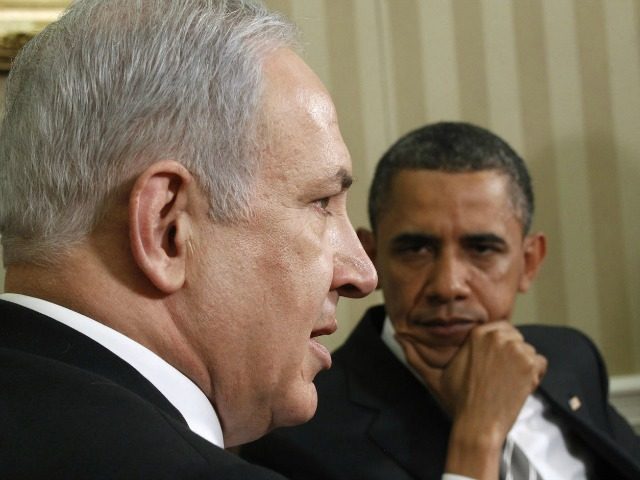In a recent interview, a former top official at Israel’s Foreign Ministry revealed an anecdote from the relationship between Prime Minister Benjamin Netanyahu and former US President Barack Obama which demonstrates the depth of the antipathy between the two men.
Dore Gold, a close confidante of Netanyahu and former director-general of the Foreign Ministry, told Israeli paper Makor Rishon that after the funeral of deceased Israeli president Shimon Peres, a telephone call came from aboard Air Force One, the presidential jet.
Yoav Horowitz, chief of staff at Netanyahu’s office, picked up.
“Tell your boss if he wants a funeral like Peres’, he should begin to move, to go forward,” said the voice on the other end, according to Gold.
The implication of the comment was that the Israeli prime minister should be more flexible when it comes to the peace process with the Palestinians.
Gold said that Netanyahu told Horowitz to respond: “Tell him that I give up the honor because I have no intention of participating in the funeral of my country.”
Gold has been close to Netanyahu, according to Makor Rishon, since before his first meeting with Obama, who was still senator.
He said in the interview that he knows of several incidents of a similar nature between Netanyahu and Obama but says that for the moment he still prefers not to disclose them.
“Maybe in two years I will tell,” he told the paper.
He accused the former White House administration of “a kind of arrogance: They developed a view according to which it does not matter what the Arabs say and what the Israelis say, they know better what are the needs of both sides.”
In the interview published on Inauguration Day, Gold said that “even now, however, I refuse to label Obama with all these definitions – ‘anti-Semitic’, ‘pro-Muslim’, ‘threw Israel under the bus.’ No way.”
Asked what he was willing to say, Gold quipped: “wrong perception.”
This ‘wrong perception,’ the interview shows, ran deep. According to Makor Rishon, Obama’s first secretary of state Hillary Clinton took to micromanaging the Israeli-Palestinian conflict and, against all accepted protocol, grilled IDF officers herself and scolded them for demolishing Palestinians’ homes.
Israel sometimes resorts to home demolitions as a deterrent measure, against families from which terrorists hailed who carried out attacks against Israelis.
Gold said “the issue of settlement has become an obsession for them. There are many signs that in the Palestinians’ eyes it wasn’t a great obstacle or a constraint preventing negotiations. But to Washington, for some reason, it became the central subject.”
As evidence, he quoted Palestinian Mahmoud Abbas, who said in 2011, amid US pressures on Israel to halt settlement construction (Israel indeed put an 11-month moratorium on all construction but this hardly resulted in progress in Israeli-Palestinian talks): “The Americans put me up on a tree and then took the ladder away.”
According to Makor Rishon, a comment by former National Security Adviser Susan Rice shows the depth of the Obama administration’s antipathy toward Israel. The paper quoted Rice as saying that even if Israel and the Palestinians would reach an agreement, the US may oppose it if it deemed it unjust toward the Palestinians.
Gold said in the interview that he realized that Israel was going to have a tough time with the US under Obama’s leadership as early as the second meeting between Netanyahu and Obama. The meeting was the first one between the two men since Obama took office.
Obama, Gold said, broke three unwritten rules of the US-Israeli relationship. The first rule is “no surprises.”
“With Netanyahu in the nineties and for a certain time with [former Israeli prime minister] Arik [Ariel] Sharon I was in charge of planning visits of the prime minister abroad. How does it work? You sit a few days in advance, determine the schedule and there are no surprises. ‘No surprises’ is one of the principles in Israeli-American ties,” Gold said.
A second principle is American recognition, even if tacitly and partially, that Israel has privileges in the greater Jerusalem area. The third principle is that US presidents respect the decisions of the presidents who preceded them.
“And here, the Israeli prime minister sits in the White House, and he is surprised. Surprised by the demand to halt construction beyond the Green Line, which was never relayed in advance. Surprised that this demand also refers to Jerusalem – what never occurred in the George [W.] Bush days. But what annoyed me more than everything else was the ignoring of Bush’s letter. The letter was reaffirmed by both houses of Congress, as if it’s a formal contract. But Obama came along, and threw Bush’s letter to the dustbin of history.”
The letter sent by former president Bush to former Israeli prime minister Ariel Sharon included a sentence on recognizing demographic changes on the ground, and was the anchor on which Israel relied in its insistence that large settlement blocs which are contiguous to the Jerusalem metropolitan area, like Gilo or Ma’ale Adumim, would remain part of Israel in any future peace agreement and that the Palestinians would receive unpopulated territory elsewhere in their stead.
“I saw this very severely,” Gold told Makor Rishon, “because we cannot return to the 1967 lines and we must be able to rely on an American promise. The Bush letter was in fact the compensation for the disengagement [from the Gaza Strip in 2005]. So I understood it was going to be tough, and that we do not have any backing for basic positions we have agreed upon in the past. The Obama administration told us: ‘We have a different position.’”

COMMENTS
Please let us know if you're having issues with commenting.